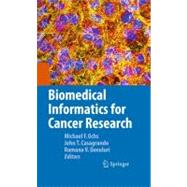
| Concepts, Issues, and Approaches | p. 1 |
| Biomedical Informatics for Cancer Research: Introduction | p. 3 |
| Clinical Research Systems and Integration with Medical Systems | p. 17 |
| Data Management, Databases, and Warehousing | p. 39 |
| Middleware Architecture Approaches for Collaborative Cancer Research | p. 73 |
| Federated Authentication | p. 91 |
| Genomics Data Analysis Pipelines | p. 117 |
| Mathematical Modeling in Cancer | p. 139 |
| Reproducible Research Concepts and Tools for Cancer Bioinformatics | p. 149 |
| The Cancer Biomedical Informatics Grid (caBIG®): An Evolving Community for Cancer Research | p. 177 |
| Tools and Applications | p. 201 |
| The caBIG® Clinical Trials Suite | p. 203 |
| The CAISIS Research Data System | p. 215 |
| A Common Application Framework that is Extensible: CAF-É | p. 227 |
| Shared Resource Management | p. 241 |
| The caBIG® Life Sciences Distribution | p. 253 |
| MeV: MultiExperiment Viewer | p. 267 |
| Authentication and Authorization in Cancer Research Systems | p. 279 |
| Caching and Visualizing Statistical Analyses | p. 291 |
| Familial Cancer Risk Assessment Using BayesMendel | p. 301 |
| Interpreting and Comparing Clustering Experiments Through Graph Visualization and Ontology Statistical Enrichment with the ClutrFree Package | p. 315 |
| Enhanced Dynamic Documents for Reproducible Research | p. 335 |
| Index | p. 347 |
| Table of Contents provided by Ingram. All Rights Reserved. |
The New copy of this book will include any supplemental materials advertised. Please check the title of the book to determine if it should include any access cards, study guides, lab manuals, CDs, etc.
The Used, Rental and eBook copies of this book are not guaranteed to include any supplemental materials. Typically, only the book itself is included. This is true even if the title states it includes any access cards, study guides, lab manuals, CDs, etc.